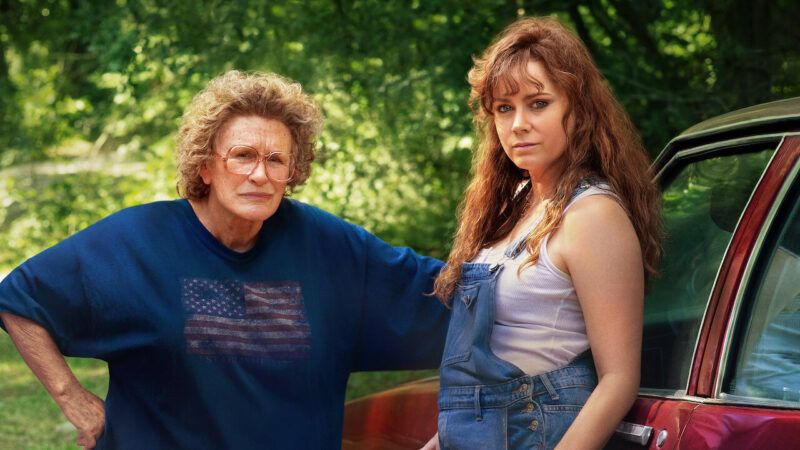Netflix's Hillbilly Elegy Is a Movie Afraid of the Book It's Based on
J.D. Vance's memoir was an inherently political story. The film tries to ignore its context.

When J.D. Vance's Hillbilly Elegy was released in summer 2016, it quickly became an object of fascination: Donald Trump was in the process of claiming the Republican presidential nomination, surprising observers both inside and outside the party who believed he had no chance. While few at that point expected Trump to win the election, his nomination left a kind of anxious uncertainty in the air—particularly about the rural, less-educated people who had backed him in large numbers. What kind of a person, what kind of an American, had voted for Donald Trump?
There was at least a little bit of condescension to these sorts of questions or, at the very least, a disconnect. The people who covered politics for a living did not understand the lives of many of the voters who had selected a major party presidential nominee.
Vance's memoir of growing up with modest means in Appalachia under the wing of a drug-addicted mother and a tough, violent grandmother offered a way in. Vance had struggled under erratic parenting and unstable living conditions before eventually joining the Marines, attending a state college, and, eventually, Yale Law School. He'd shed his self-defeating hillbilly habits and could offer critical insight into the world he'd been born into.
His book was thus taken as an empathetic, self-critical explanation of their culture, their inclinations, and their flaws from someone who had grown up in that milieu and found a way out. In the headline to a generous, mostly positive review, The New York Times called it "a tough love analysis of the poor who back Trump."
Trump's political ascendancy had raised big questions about America's political psyche: Vance's book had a distinctive conservative tilt, but it also had answers.
Trump won the election. The book became a bestseller. Vance was lauded for his insight into the Trump-supporting, working-class Appalachian voters who had proved so critical to the president's shock victory. The book was optioned for a cinematic treatment: The phenomenon would become a movie.
That movie arrives today on Netflix, just in time for awards season. Directed by Ron Howard and starring Amy Adams as Vance's mother Bev, and Glenn Close as his grandmother Mamaw, the movie is certainly a product of top-notch Hollywood talent. Yet it doesn't work at all.
The operating theory behind the adaptation seems to have been: What if we took all of the aspects of the book that made people interested—the cultural insights and self-criticism, the ethnographic examination of dysfunctional Appalachian life and its unspoken codes—and completely stripped it away?
The book was a phenomenon because it was an object of sociopolitical fascination. It was treated as a field guide to what was essentially a foreign culture (at least to a lot of urban, college-educated professionals) hidden in the American hinterlands. The movie, in contrast, is a context-free, episodic story of one guy's adolescent struggles with a difficult family. In the end, he goes to college. That's it.
It doesn't help that, on-screen, that one guy is bland and boring; the movie's Vance is played with schlubby dullness by Gabriel Basso and Owen Asztalos, neither of whom have the charisma to stand up to the fireworks produced by Close and Adams. And though both actresses deliver committed performances, the screenplay by Vanessa Williams gives them precious little to play except scene after scene of histrionics. It's repetitive and context-less. There's no arc or narrative drive. The movie repeatedly shows us that they are erratic and difficult; it never hints at the reason why.
Howard may be to blame. At this point, he's been making movies for more than three decades, and he is, if nothing else, one of Hollywood's most reliable project managers: He was brought in to salvage the remains of the Han Solo spinoff, Solo: A Star Wars Story, after the original directors were fired mid-production, and he has a long history of producing solid, competent, occasionally cheesy, populist entertainments with strong performances at their center.
His movies are, above all, studiously inoffensive. Here, he seems to have decided that the book's political context might spark controversy, turning off some viewers. In some ways that's understandable, given the tendency of some filmmakers to put politics at the center of their movies at the expense of all else. But the political context was what drew people to Hillbilly Elegy in the first place, what turned it into an event. Without that context, it's not about anything at all; it's just a story of a kid with a rough home life who eventually gets into Yale.
The movie is so studiously apolitical that it seems afraid to have a point or an argument or an idea about the world, which in turn makes it seem afraid of the book it's based on. Instead of adapting the book's ideas to the screen, it just ignores them, pretending they don't exist. Notably, Vance's military service, a formative life event that in his own telling taught him diligence and discipline, is largely absent, making Vance's transformation from troubled kid to star student even more mysterious. Coming now, in the twilight of Trump's presidency, Howard's Hillbilly Elegy isn't just a film without any answers; it's a film that's too timid to even ask any questions.


Show Comments (41)